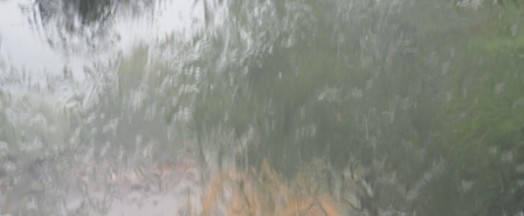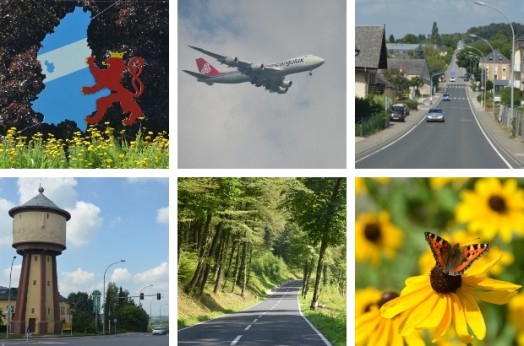Once upon a time, a girl had a simple dream to travel around the world. She didn’t mind how. She didn’t mind where. She would just blow with the wind. One day, she met the boy that she knew she would marry. In the run up to their marriage, they talked about the dream and the boy liked the idea of it. Only he liked to plan things. So he started to ponder and research how best to stretch a small budget to see as much of the world as possible. Accommodation and transport would be the biggest cost; how could they be combined to save money? A motorhome. As planning intensified, it became clear that the geographical boundary would need to be mainland Europe… but how much does it cost to tour Europe in a motorhome? Enter pioneering data-lovers Adam + Sophie and Julie + Jason with very thorough accounts of their motorhome trips around mainland Europe. After scouring their records, the budget was set; £1000 per month.
Roll the clock forward a few months and the boy and girl were… stuff this, I’ll stop talking in the third person. We thought that a year would be a good time frame for travelling, so we’d need £12000 once we’d bought the van. Our first year of marriage was a very frugal one as we put aside as much money as we could on top of what we’d already got in savings (from regular saving over many years as well as wedding gifts), but we reached our target amount. To cut a long story (which is all documented in this blog!) short, we finally set out on the trip 3 months after we’d originally planned, having spent the budget for those 3 months on getting Bertha prepared… and living during that time. Add a month back in the UK in March, seeing family and having more repairs performed on Bertha, and we ended up spending 8 months in total on the road… coming in a little under budget.
Now one thing we learned from our pre-trip research was that as there are many different ways of travelling and many different types of motorhome, there’s no right answer to the question “how much does it cost?”. Add exchange rates into the equation (when we started our travels it was 1.17 euros to the pound, and it peaked at 1.27 euros to the pound) and even if a right answer existed, it would be subject to change. In efforts to try to give a broader idea of costs (i.e. not just our own), here are links to cost breakdowns from other European motorhome travellers:
And us? Well, we travelled 11878 miles over 242 days between 2013 and 2014. These figures though hide the fact that in reality ours was a trip of two halves where we did things differently in the second half. On our first loop, we travelled 7368 miles as opposed to only 4510 miles in the second loop. Both loops were roughly the same length (122 days and 120 days respectively) but by co-incidence we only drove on 91 of those days on each loop, giving an overall mean of 65 miles per driving day.
Most of the costs of a motorhome trip are dependent on how many days you’re on the road… apart from fuel, which depends on the number of miles that you’re travelling. So, what was the damage?
- Adam + Sophie – 17p per mile in a 7 year old panel van conversion
- Julie + Jason – 17p per mile in a 21 year old a-class motorhome
- Stu + Sarah – 27p per mile in a 5 year old coachbuilt motorhome
- Us – 26p per mile in a 24 year old coachbuilt motorhome
However…it’s worth noting those that these figures are based on cost of fuel rather than fuel efficiency. As we found out, the price of fuel varies massively between countries, so assuming that a high cost of fuel correlates to low fuel efficiency isn’t a given. Additionally, fuel efficiency can be affected by many things; quality of fuel at pumps, the terrain and driving style to name just some. However, does choosing a coachbuilt van over a more streamlined a-class or panel van conversion make a difference in cost? It would appear so. Does the fuel type make a difference too (Bertha being the only petrol van)? Maybe… in hindsight it might have been cheaper for us to convert her to run on LPG, but we have no concrete figures to back up that suggestion.
So moving on from the cost of travel, we come on to the cost of living. This is so subjective; if you were to stay on a campsite every night and eat out at restaurants the whole time, of course your cost of living would be higher than if you were to aim to stay on aires / wild camp and cook in the van the whole time. There’s also the question of whether you take toll roads when you travel and how many galleries / museums / attractions you choose to pay for. For this reason (and because we’ve all used different categories!) it’s unfair to directly compare how the different couples chose to live on the road.
However, there is an interesting comparison between the first loop of our trip and the second in terms of what we spent. On the first loop we covered a lot more ground, and were at the receiving end of great hospitality at a lot of different projects that we helped at. We also took ferries from Greece to Italy, then from Spain back to the UK (rather than from France), which made a massive difference, as did the unexpected Swiss breakdown. With the second loop, we travelled at a more leisurely pace and were a lot more self-sufficient (although we were treated like royalty by the people we visited in Germany + Belgium).
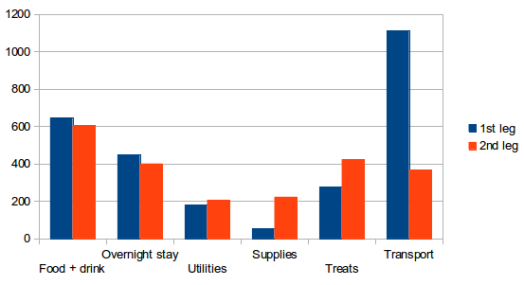
But overall, leaving petrol aside as we’ve already determined that it’s based on mileage rather than how many days you’re on the road, this was the distribution of costs:
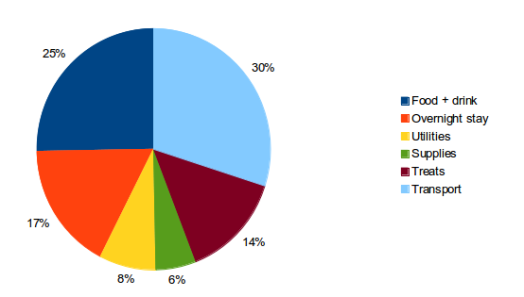
Food + drink covers supermarket shops and everyday eating
Overnight stay covers campsites, guarded car parks etc
Utilities covers water, electricity, gas (for cooking + heating), clothes washing, phone + internet etc
Supplies covers toiletries, video camera tapes etc
Treats covers meals out, entrance to attractions, beer, wine etc
Transport covers tolls, vignettes, public transport, repairs to Bertha
Whilst this could be broken down further into costs per country, we’ve found from our own figures that this can actually be misleading. Where we were about to cross a border from a “cheap” country to an “expensive” country, we made sure that we stocked up on food and fuel in the cheap country. Similarly, we would let supplies run low in the more expensive countries if we knew we were moving to a cheaper country. This had a smoothing effect on the country averages; making the expensive countries seem cheaper and the cheaper countries seem more expensive. But then again, the definitions of “cheap” and “expensive” countries is subjective.
So, the moment you’ve been waiting for; the total cost per day of life on the road for us was… wait for it… £33.45. Much cheaper than living in London!
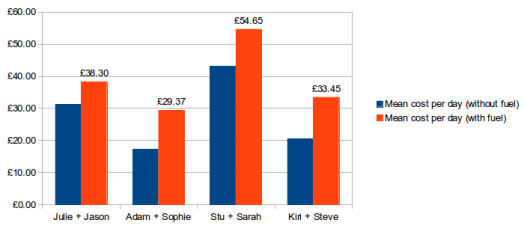
However… it should be noted that none of these figures include vehicle tax, vehicle insurance (which isn’t insignificant if you’re full-timing), travel insurance and breakdown cover. But, the good news is that depreciation on second hand motorhomes (or in our case an eleventh-hand motorhome!) is minor if you take care of it. Once the adventure is over, should you choose to pass on your home to another keeper, it should be possible to get back near enough what you paid for it (or at least that’s what we’re hoping).
There are many more caveats that could be added to this data, but hopefully this gives a rough idea of what your trip around Europe in a motorhome might cost. Go on, you know you want to!


















